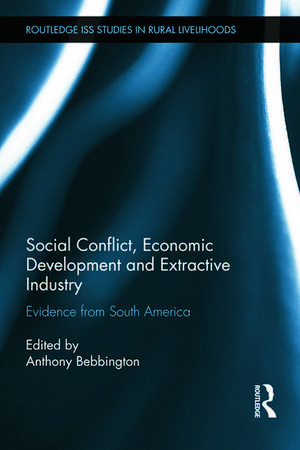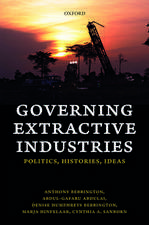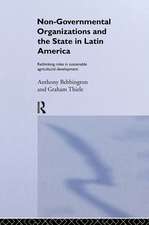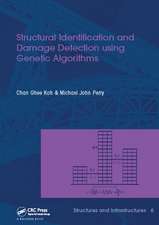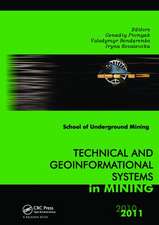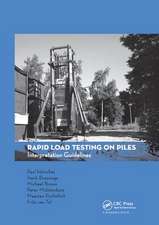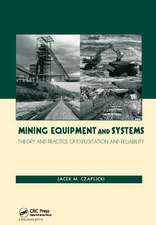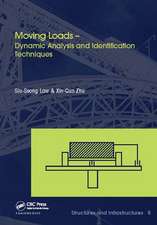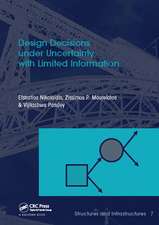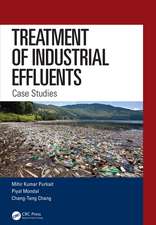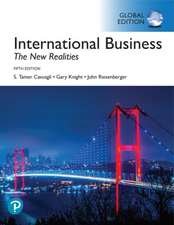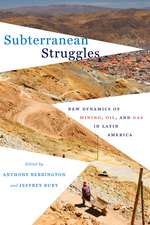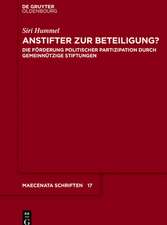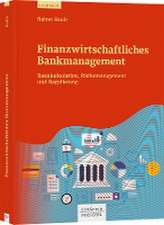Social Conflict, Economic Development and Extractive Industry: Evidence from South America: Routledge ISS Studies in Rural Livelihoods
Editat de Anthony Bebbingtonen Limba Engleză Paperback – 8 aug 2013
This book speaks directly to this question and to the different ways in which Latin American countries are responding to the challenge of extractive industry. The contributors are a mixture of geographers, economists, political scientists, development experts and anthropologists, who all draw on sustained field work in the region. By digging deep into both national and local experiences with extractive industry they demonstrate the ways in which it transforms economies, societies, polities and environments. They pay particular attention to the social conflict that extraction consistently produces, and they ask how far this conflict might usher in political and institutional changes that could lead to a more productive relationship between extraction and development. They also ask whether the existence of left-of-centre governments in the region changes the relationships between extractive industry and development.
The book makes clear the immense difficulties that countries and regional societies face in harnessing extractive industry for the collective good. For the most part the findings question the wisdom of the development model that many countries in the region have taken up and which emphasises the productive roles of mining and hydrocarbon industries. The book should be of interest to students and researchers of Development Studies, Geography, Politics and Political Economy, as well as Anthropology.
| Toate formatele și edițiile | Preț | Express |
|---|---|---|
| Paperback (1) | 487.37 lei 43-57 zile | |
| Taylor & Francis – 8 aug 2013 | 487.37 lei 43-57 zile | |
| Hardback (1) | 1062.62 lei 43-57 zile | |
| Taylor & Francis – 27 sep 2011 | 1062.62 lei 43-57 zile |
Preț: 487.37 lei
Nou
Puncte Express: 731
Preț estimativ în valută:
93.26€ • 97.62$ • 77.62£
93.26€ • 97.62$ • 77.62£
Carte tipărită la comandă
Livrare economică 31 martie-14 aprilie
Preluare comenzi: 021 569.72.76
Specificații
ISBN-13: 9780415710718
ISBN-10: 0415710715
Pagini: 280
Ilustrații: 6 black & white illustrations, 10 black & white tables, 6 black & white line drawings
Dimensiuni: 156 x 234 x 18 mm
Greutate: 0.41 kg
Ediția:1
Editura: Taylor & Francis
Colecția Routledge
Seria Routledge ISS Studies in Rural Livelihoods
Locul publicării:Oxford, United Kingdom
ISBN-10: 0415710715
Pagini: 280
Ilustrații: 6 black & white illustrations, 10 black & white tables, 6 black & white line drawings
Dimensiuni: 156 x 234 x 18 mm
Greutate: 0.41 kg
Ediția:1
Editura: Taylor & Francis
Colecția Routledge
Seria Routledge ISS Studies in Rural Livelihoods
Locul publicării:Oxford, United Kingdom
Public țintă
Postgraduate and UndergraduateCuprins
Part 1: Political Economies of Extraction 1. Extractive Industries, Socio-Environmental Conflicts and Political Economic Transformations in Andean America Anthony Bebbington 2. The Political Economy of Managing Extractives in Bolivia, Ecuador and Peru Jose Carlos Orihuela and Rosemary Thorp 3. The Politics of Extractive Industries in the Central Andes John Crabtree and Isabel Crabtree-Condor Part 2: Conflicts, Transformations and Institutional Change 4. Social Conflict and Emergent Institutions: Hypotheses from Piura, Peru Anthony Bebbington 5. Mining and Conflict in Peru: Sowing the Minerals, Reaping a Hail of Stones Javier Arellano-Yanguas 6. Sovereignty Negotiated: Anti-Mining Movements, the State and Multinational Mining Companies under ‘Correa's Twenty-First Century Socialism’ Jennifer Moore and Teresa VelÁsquez 7. State-Indigenous Tensions over Hydrocarbon Expansion in the Bolivian Chaco Denise Humphreys Bebbington 8. Planning Development Futures in the Ecuadorian Amazon: The Expanding Oil Frontier and the Yasuní-ITT Initiative Laura Rival 9. The Camisea Gas Project: Indigenous Social Movements and International NGOs in the Peruvian Amazon Brian Pratt 10. Household and Community Responses to Mining-Related River Contamination in the Upper Pilcomayo Basin, Bolivia David Preston Part 3: Conclusions and Comparisons 11. Afterward: Mining Conflict in Bolivia, Ecuador and Peru Stuart Kirsch 12. Conclusions Anthony Bebbington
Notă biografică
Anthony Bebbington is Higgins Professor of Environment and Society and Director of the Graduate School of Geography at Clark University, USA. He is also a Professorial Research Fellow in the School of Environment and Development at the University of Manchester, UK, and Research Associate of the Centro Peruano de Estudios Sociales, Lima, Peru.
Recenzii
‘This book has a subtle combination of dealing with practical social problems of development and rich academic insights. The complex development and welfare challenges in the emerging and underdeveloped economies of Latin America, that have implications for institutional changes, are well presented. In the process, it exemplifies the case of social conflict in South America showing that the same research work can be replicated for other developing and emerging economies of the world.’ — Rupamanjari Sinha Ray, Area Chairperson, Economics Management Development Institute, India, Vision (16:1) 2012
'Overall, this book successfully contributes to theoretical and practical debates. The contributions illustrate the possibilities and obstacles for conflict-induced institutional reform recognizing various factors. Meticulously documenting the effects mining has on local communities and their struggle for rights, self-determination and compensation, the book makes a significant contribution to understanding the dynamics of mining conflicts in Bolivia, Ecuador and Peru.' — Community Development Journal (Vol 48, No 3, 2013)
'Overall, this book successfully contributes to theoretical and practical debates. The contributions illustrate the possibilities and obstacles for conflict-induced institutional reform recognizing various factors. Meticulously documenting the effects mining has on local communities and their struggle for rights, self-determination and compensation, the book makes a significant contribution to understanding the dynamics of mining conflicts in Bolivia, Ecuador and Peru.' — Community Development Journal (Vol 48, No 3, 2013)
Descriere
This multidisciplinary book offers a comparative reading of the conflicts between large mining industries and peasant and indigenous communities in Peru, Bolivia and Ecuador, focusing on the wider political economy of extractives in Latin America.
